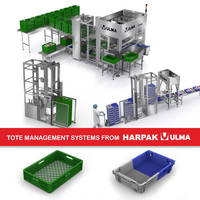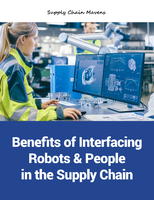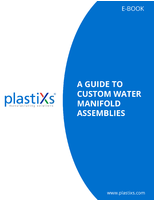New Automated Tote Management System Utilizes Closed-Loop Process
Press Release Summary:

- Employ reusable containers made of plastic or cardboard to transfer products, accommodating a wide range of products and primary packaging types
- Increases reliability and throughput, reduces long-term costs, and provides ergonomic improvements that enhance workplace safety
- Available in variety of types and open/stackable configurations and comes with tote loading robotics with flexible, customizable end-of-arm tooling
Original Press Release:
Harpak-ULMA Announces Automated Tote Management System for Food
Automating sustainable packaging practices for improved ROI
Taunton, Mass., March 3, 2020 — Harpak-ULMA, the North American arm of ULMA packaging, today announced the commercial availability of an automated tote management system for food producers. This approach to reusable secondary packaging represents an addition to the innovative sustainability efforts launched a year ago under the global #ULMAweCare initiative.
#ULMAweCare is a long-term global program to address the mounting packaging sustainability challenges facing today’s manufacturers that seeks to advance sustainability through innovative, environmentally friendly solutions that promote the reduction of packaging and the use of recyclable materials. Tote systems employ reusable containers made of plastic or cardboard to transfer products, accommodating a wide range of products and primary packaging types. Reusable plastic totes not only reduce carbon emissions, waste, and natural resource consumption, they offer improved product protection versus cardboard alternatives. Durable plastic totes are easy to clean, hygienic, resist water and chemicals, and are consistently sized. Plastic totes have been shown to reduce product damage by up to 96% while lowering costs by as much as 27% through more efficient, reusable distribution processes.
Harpak -ULMA’s automated tote management system utilizes a closed-loop process to drive cost savings. In the initial automated operation, stacked foldable totes are de-palletized, de-stacked, opened using a multiformat opener (or rejected as unopened), distributed, and delivered to the packaging process. In the return phase, totes are collected, prepared/cleaned, and conveyed for set up again. While tote systems can leverage traditional material handling equipment, stacking and de-stacking often requires manual intervention. The company’s automated system increases reliability and throughput, reduces long-term costs, and provides ergonomic improvements that enhance workplace safety. Since totes are available in a variety of types and open/stackable configurations, Harpak-ULMA advocates tote loading robotics with flexible, customizable end-of-arm tooling that can be tailored to handle unique tote requirements. The solution employs a 4 Axis tote-packing robot that operates at up to 80 trays per minute. The specific palletizing system employed for secondary packaging will be guided by a combination of product versatility and production volume requirements. Harpak-ULMA designed an associated buffer system to optimize palletizing equipment performance for either robotic or mechanical palletizers.
Harpak-ULMA Automation Manager John Weddleton offered some insight for customers looking to switch from RSC (regular slotted carton) boxes to totes. “First, it’s critical to understand your complete production process, from processing to packaging. Number two, don’t underestimate the importance of tote automation. In this solution, totes arrive washed, folded and stacked to a height of seven feet. Sans automation, manually feeding would require staff to pull the top layers off a 7-foot stack, as well as endure a lot of lifting, bending, and placing – that’s more labor and opens up the possibility of worker injuries. Third, keep in mind that palletizing requires more totes than RSC’s since totes are generally loaded with a single product layer while RSC boxes traditionally hold two or three product layers each. This not only increases the repetitive motions required to make a complete pallet, but it also affects the physical height of the completed pallets.” He added, “Anytime a packaging component makes multiple journeys, the number of cycles it can be used will have a big impact on your sustainability ROI. While automated, reusable solutions must address all these complex issues, they deliver significant benefits in terms of labor and operating cost reductions, worker safety, and productivity.”
Kevin Roach, Harpak-UMA’s CEO, is an outspoken advocate for innovation in the packaging industry. His broad vision embraces everything from smart-connected packaging platforms that enable emerging technologies such as augmented reality, to advancements in reusable and recyclable materials that can help Harpak-ULMA’s customers address growing social concerns regarding natural resources. “We always strive to provide our customers with the lowest possible Total Cost of Ownership for their packaging solutions. Increasing our customers’ options through innovation-driven sustainability efforts has become a very important part of that equation,” Roach said.
Harpak-ULMA leverages Allen Bradley industrial control systems as their platform of choice for smart, connected packaging solutions, including totes management. Ease of integration is key to accelerating innovation and achieving productivity gains at digital transformation scale. Utilizing Rockwell Automation’s controls and information platforms offers Harpak-ULMA’s customers one of the industry’s most advanced integration capabilities, improving the ease and reducing the cost of embracing new innovative solutions. Customers easily adapt to market changes at less cost, improve OEE/MTBF/MTTR, productivity and safety metrics, overcome the challenges of an aging and evolving workforce, and better control maintenance expenses with competitive parts sourcing.
About Harpak-ULMA
Harpak-ULMA is the North American arm of ULMA, a $1B industry leader in complete packaging line solutions for Food, Medical, Bakery, and Industrial products. Harpak-ULMA provides smart, connected packaging systems that deliver greater efficiency, uptime, and throughput, as well as better package quality and reduced waste. Well-designed, reliable solutions operate with faster changeovers, less labor, and lower maintenance costs, reducing customers’ total cost of ownership. In addition to offering ULMA primary packaging equipment, Harpak-ULMA is also the exclusive North American distributor of G. Mondini tray sealers, RAMA secondary packaging machinery, and DIGI weigh/price/labeling equipment. Harpak-ULMA joined the Rockwell Automation Partner Network in 2018 as part of its initiative to build and deploy smart, connected packaging solutions.
For more information, contact Mary Ahlfeld at maryahlfeld@harpak-ulma.com.
Contact:
Mary Ahlfeld
Harpak-ULMA
508-884-2500
maryahlfeld@harpak-ulma.com




